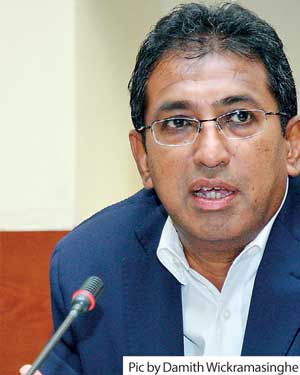Reply To:
Name - Reply Comment
 The recent election drubbing will not make the government to halt the economic reforms agenda it has already set in motion but the country may experience a slowdown in implementation of such reforms, an economist-turned-legislator in charge of national policy making process said.
The recent election drubbing will not make the government to halt the economic reforms agenda it has already set in motion but the country may experience a slowdown in implementation of such reforms, an economist-turned-legislator in charge of national policy making process said.
“We have to maintain macro stability. So, the government is not planning on abandoning what we’ve started. However, we may not be able to maintain the same speed,” National Policies and Economic Affairs State Minister Dr.Harsha de Silva said at a panel discussion organized by the state-funded Institute of Policy Studies (IPS), yesterday.
“We are not going to let loose for political expediency,” he added.
According to political analysts, the landslide victory of the Sri Lanka Podujana Peramuna (SLPP), backed by the former strongman Mahinda Rajapaksa at the recent local government polls was a result of the Sirsena-Wickremesinghe coalition government’s obsession with the reform process, which made them overlook the political realities.
The absence of an effective communication apparatus making the public aware of the mid and long-term positives of such reforms also contributed significantly to the government ending up on the losing side.
It remains to be seen how much of reforms the government can push forward in the next 18 months before parliamentary elections and whether there will be changes to its policy agenda with President Maithripala Sirisena showing signs of getting more involved in the economic policy making process, which was previously spearheaded by Prime Minister Ranil Wickremesinghe.
Last week President’s Media Division in a statement said the National Economic Council (NEC) chaired by President Sirisena would present a new economic policy plan this week to address the key economic issues.
In the run-up to the local government elections, President Sirisena said he would take over the economic management of the country in order to reduce the cost of living burden on the people.
Possibly humbled by the recent people’s verdict, Dr.de Silva said the government “is really questioning its own policies” and admitted that what may look elegant in theory may not be implementable on the ground.
“Theoretically we know what has to happen. And politically we know what is possible and what is not. So then as a smart government, if we are one, we need to realise the competing interest.
“That’s kind of the dilemma we are facing,” he said.
Explaining the tricky nature of public policy Dr. de Silva said the third best solution to a problem has the best chance of being implemented as balancing various interest groups is not an easy task.
Meanwhile, Ceylon Chamber of Commerce Chief Economist Shiran Fernando, who was also one of the panelists, cast doubts over the political space available for the government to implement cost-reflective pricing formulae for fuel and electricity following the local government election results.
The government has however committed under the structural benchmarks of the International Monetary Fund to introduce a pricing formula for fuel this March and a pricing formula for energy by September.
Central Bank Governor Dr.Indrajit Coomaraswamy recently said Sri Lanka does not have fiscal space for any populist policies and urged the government to ‘stay the course’ to avoid any downside risk to economic stability.
He cautioned that Sri Lanka could even run the risk of defaulting on its loan payments during the next 4-year period if fiscal policy is loosened drastically.
Sri Lanka is now in one of the worst debt servicing cycles, with domestic debt servicing hitting a peak this year, and foreign debt servicing to spike from 2019 to 2022 with over US$ 3 billion in repayments each year; around double the norm over the past few years.